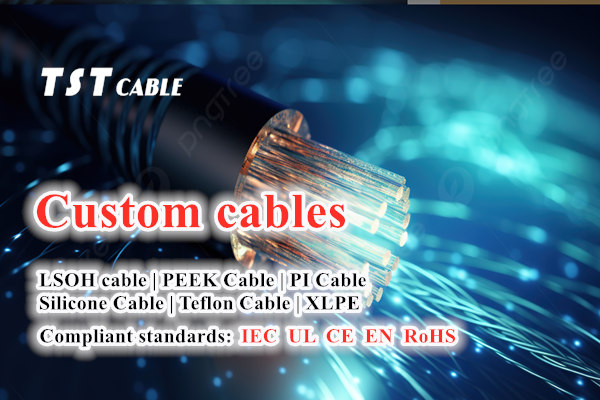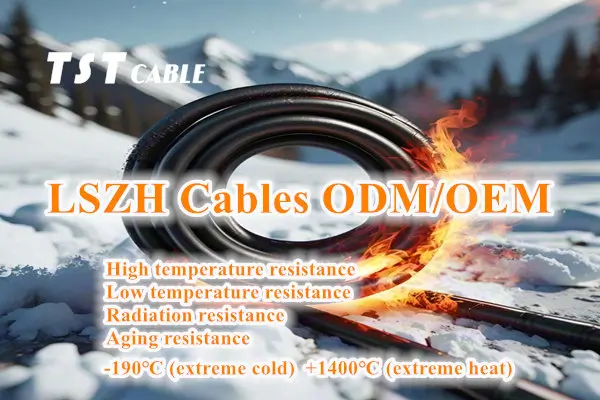PTFE (polytetrafluoroethylene) insulated cables are highly favored in a variety of applications due to their excellent performance. PTFE materials have many unique properties that make this type of cable perform well in specific environments.

First, in terms of materials, the conductors of PTFE cables are mostly tinned copper or gold-plated copper, and the insulation layer is made of polytetrafluoroethylene (PTFE) as the main raw material, while the insulation layer of ordinary cables is generally made of common plastics such as polyethylene and polyvinyl chloride.
Second, in terms of performance, PTFE cables have excellent high temperature resistance, corrosion resistance and mechanical properties, and can operate in a temperature range of -200℃ to +260℃, while ordinary cables have poor high temperature resistance and are generally used between 0℃ and 70℃.
Furthermore, in terms of usage, PTFE cables are widely used in high-end fields such as aerospace, military, communications, and medical, requiring stable and reliable signal transmission; while ordinary cables are mainly used in power
The following are the advantages of PTFE insulated cables:
1. Excellent temperature resistance
High temperature stability: PTFE can withstand extremely high temperatures, usually operating in the range of -200°C to +260°C, and some special grades of products can even reach higher temperature limits. This means it is very suitable for applications under extreme temperature conditions.
Low low-temperature brittle fracture point: Even at very low temperatures, PTFE will not become brittle or lose its mechanical strength, ensuring the reliability and flexibility of the cable in cold environments.
2. Chemical inertness
PTFE shows strong resistance to most chemicals, including acids, alkalis, solvents and other corrosive substances. This makes PTFE insulated cables an ideal choice for the chemical industry, laboratories, and pharmaceuticals.
3. Excellent electrical properties
High dielectric strength: PTFE has excellent insulation properties and can provide a high breakdown voltage, ensuring the safety and efficiency of power transmission.
Low dielectric constant: helps reduce signal delay and attenuation, and is particularly suitable for high-frequency data transmission applications such as communication networks and internal wiring of electronic equipment.
4. Good mechanical properties
Abrasion resistance and tear resistance: PTFE has a smooth and hard surface, is not easy to wear, and has good tear resistance, which extends the service life of the cable.
Good flexibility: Although PTFE itself is a rigid plastic, the cable made from it can maintain a certain degree of softness, which is easy to bend and install.
5. Self-lubricating and non-stick properties
PTFE is known for its famous “non-stick” effect, which also gives the cable excellent sliding performance, reduces friction, and is conducive to the arrangement and movement of cables in small spaces.
6. Low smoke and halogen-free, fire-retardant
PTFE is a self-extinguishing material that will not continue to burn in the flame and will not release toxic smoke or gas, which improves fire safety.
7. Environmentally friendly
Compared with halogen-containing materials, PTFE does not contain chlorine or other harmful elements, so it is more environmentally friendly and meets the requirements of modern green buildings and sustainable development.
8. Lightweight
PTFE has a lower density, making PTFE insulated cables lighter than other types of cables, which is very important for aviation, aerospace and other weight-sensitive applications.
Applications
PTFE insulated cables are widely used in the following fields:
Aerospace: where you need to withstand extreme temperature changes and reduce weight.
Military equipment: where high reliability and durability are required.
Industrial automation: factories involving large amounts of corrosive chemicals.
Medical equipment: environments that must meet strict cleaning and disinfection standards.
Automotive manufacturing: the pursuit of heat resistance and lightweight, especially in electric vehicles.
Data centers and telecommunications infrastructure: efficient data transmission and long-life solutions are required.
PTFE insulated cables have become an indispensable part of many mission-critical applications due to their excellent physical, chemical and electrical properties. If you are looking for a cable that can work stably and long-term under harsh conditions, TST CABLES PTFE insulated cables are undoubtedly a choice worth considering.
Also available in:
English





